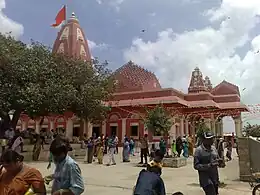Daruka
Daruka is the name of two major characters in Hindu mythology:
Daruka (Sanskrit: दारुक, romanized: Dāruka) refers to the charioteer of the deity Krishna.
Dārukā (Sanskrit: दारुका, romanized: Dārukā) refers to the name of a rakshasi.
Charioteer Daruka
| Part of a series on |
| Hindu mythology |
|---|
 |
| Sources |
| Cosmology |
| Deities |
| Personalities of the Epics |
| Hinduism Portal |
The epic Mahabharata features Daruka as the charioteer of Krishna. Described to be skilled at his task, he appears during a number of chapters of the text. Daruka is assailed by King Shalva's arrows when he attacks Dvaraka after the death of his ally, Shishupala. During the Kurukshetra War, hearing Krishna's conch, he brings his chariot to the battlefield. He drives Satyaki's chariot when the warrior fights against Karna, demonstrating excellent manoeuvrability. Krishna bids Daruka to inform his family at Dvaraka and the Pandavas at Indraprastha of the death of the Yaduvamsha clan, after his chariot ascends to the heavens.[1][2][3]
Rakshasa Daruka
The Shiva Purana features the rakshasi Dārukā and her husband, a rakshasa named Dāruka, who terrorised the forest named after them, called the Darukavana. Dārukā is stated to have acquired a boon from the goddess Parvati, upon which she grew arrogant and reckless. The inhabitants of the forest sought the assistance of the sage Aurva, who declared that any rakshasa who attacked them further upon the earth would perish. The devas, led by Indra, started to wage war on the beings.[4] To save the race from extermination, Dārukā suggested that they move to an island beneath the ocean. The forest would follow with them owing to her boon, and they would not be further attacked. Now safe, the beings started to harass people who travelled upon the boats above and imprisoned them. One of the prisoners was a Shaiva devotee named Supriya. He taught the other prisoners the Panchakshara mantra of Shiva. The rakshasa Dāruka attempted to kill Supriya. Shiva appeared to rescue his devotee, slaying Dāruka with the Pashupatastra.[5] When his wife, Dārukā, prayed to Parvati for mercy, the goddess urged her consort to spare her life. Hearing her plea, Shiva allowed her and the other rakshasas to reside in the forest. Shiva assumed the form of a Jyotirlinga with the name Nageshvara in the site, while the goddess Parvati came to be venerated as Nageshvari.[5][6]

In another version, in the realm of the netherworlds, there resided a demoness named Daruka who engaged in deep penance to appease the powerful and eternal Goddess Adi Shakti. Reciting the sacred mantra "Om Adi Shakti aye Namo Namah," Daruka's devotion caught the attention of Goddess Adi Shakti, who appeared before her. Impressed by Daruka's penance, the benevolent goddess granted her a boon. Daruka humbly requested the protection of her husband and the demon clan, along with a source of sustenance. In response, Goddess Adi Shakti bestowed her blessings upon Daruka, creating a lush forest where they could find solace and security. She assured Daruka that she, her husband, and their demon clan would be safeguarded. With her divine mission accomplished, Goddess Adi Shakti vanished from sight.[7]
However, upon learning of the boon and the protection granted by Goddess Adi Shakti, Daruka's husband, Daruk, harbored malevolent intentions. Envisioning an opportunity to feast upon the beings of Earth, including humans, animals, and plants, he urged Daruka to transport their forest to the mortal realm. Succumbing to his desires, Daruka complied. Yet, their wicked actions did not go unnoticed. A wise sage, observing their malevolence, invoked a curse upon Daruk, Daruka, and the entire demon clan. The curse dictated that any attempt to harm gods or sages would lead to their ultimate demise. Lord Shiva, too, expressed his disapproval and cursed the unrighteous demons, decreeing that they would meet their end if they engaged in wrongful deeds.[7]
This turn of events sparked a heated argument between Goddess Adi Shakti and her consort, Lord Shiva, regarding the consequences of the curses. Seeking resolution, Daruk and Daruka eventually pledged to both deities that they would renounce their demonic ways. Embracing a newfound commitment to righteousness and harmony, they vowed to live peacefully alongside human beings, animals, and plants. Henceforth, Daruk and Daruka embarked on a transformed existence, leaving behind their malevolent past and embracing a life of coexistence and tranquility with all living creatures.[7]
References
- Vaidik Sudha (2020-06-17). Puran Encyclopedia. p. 203.
- Vaswani, J. P. (2019-06-20). Stories with a difference from the Bhagavata Purana. Gita Publishing House. p. 297. ISBN 978-93-86004-23-9.
- Hudson, D. Dennis (2008-09-25). The Body of God: An Emperor's Palace for Krishna in Eighth-Century Kanchipuram. Oxford University Press, USA. p. 288. ISBN 978-0-19-536922-9.
- Books, Kausiki (2021-10-24). Siva Purana: Koti Rudra Samhitha: English Translation only without Slokas. Kausiki Books. pp. 169–175.
- "Dharmakshetra.com". Archived from the original on 2003-11-25. Retrieved 2020-04-28.
- The Purāṇas: The Encyclopedia of Indian History and Culture. Shri Bhagavan Vedavyasa Itihasa, Samshodhana Mandira (Bhishma). 1993.
- "Daruka and her boon, short story by Sathyam-Drew". Booksie.